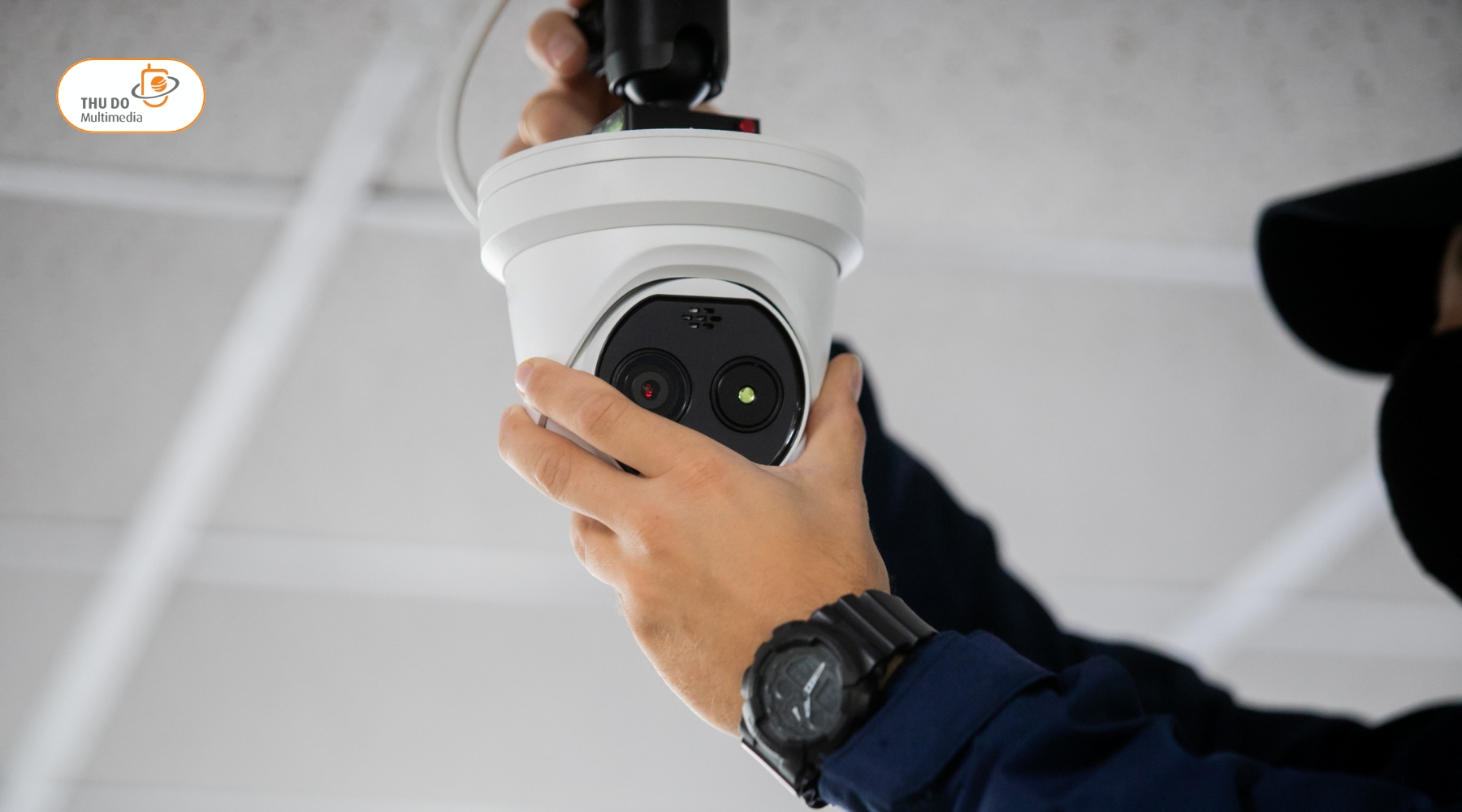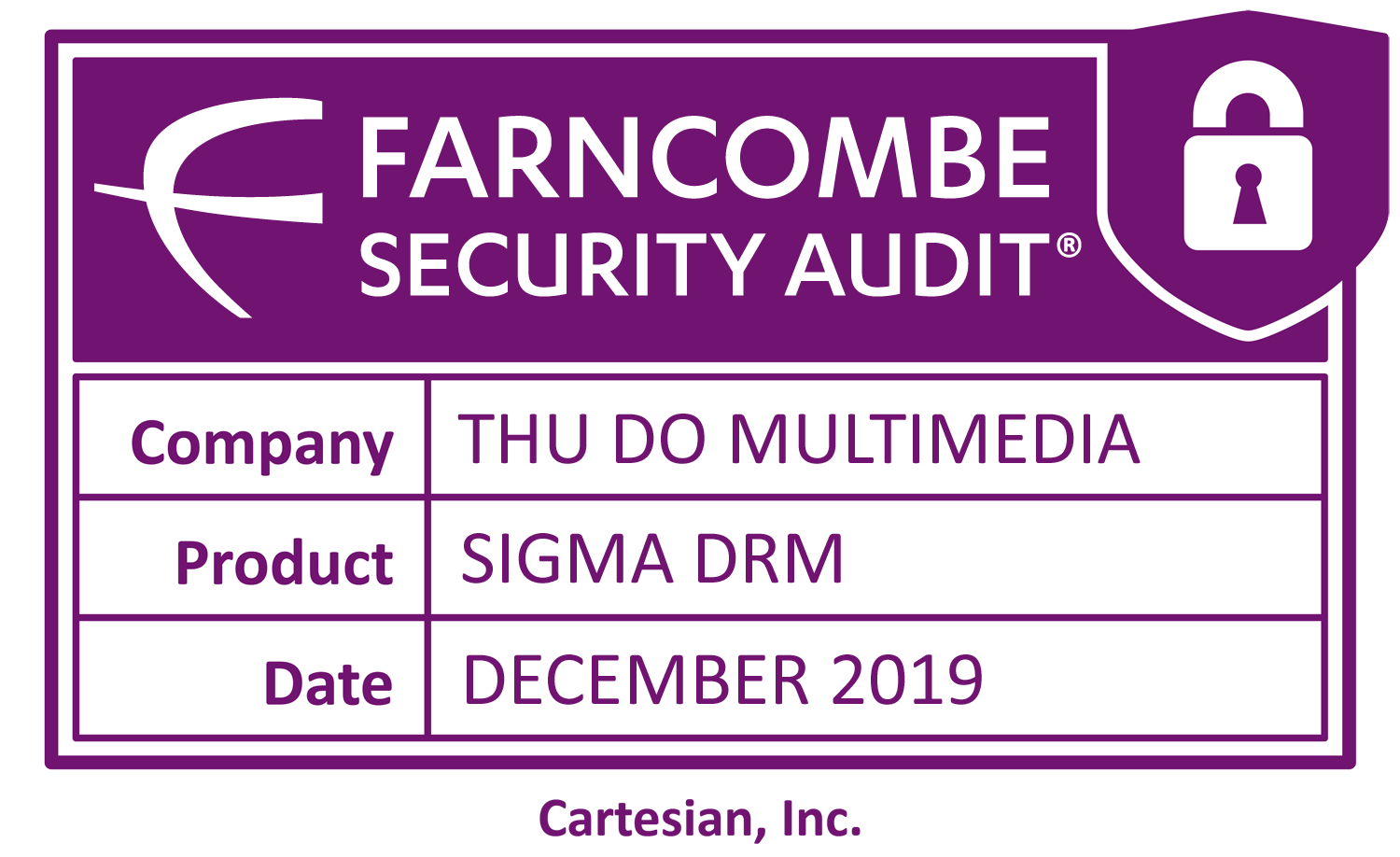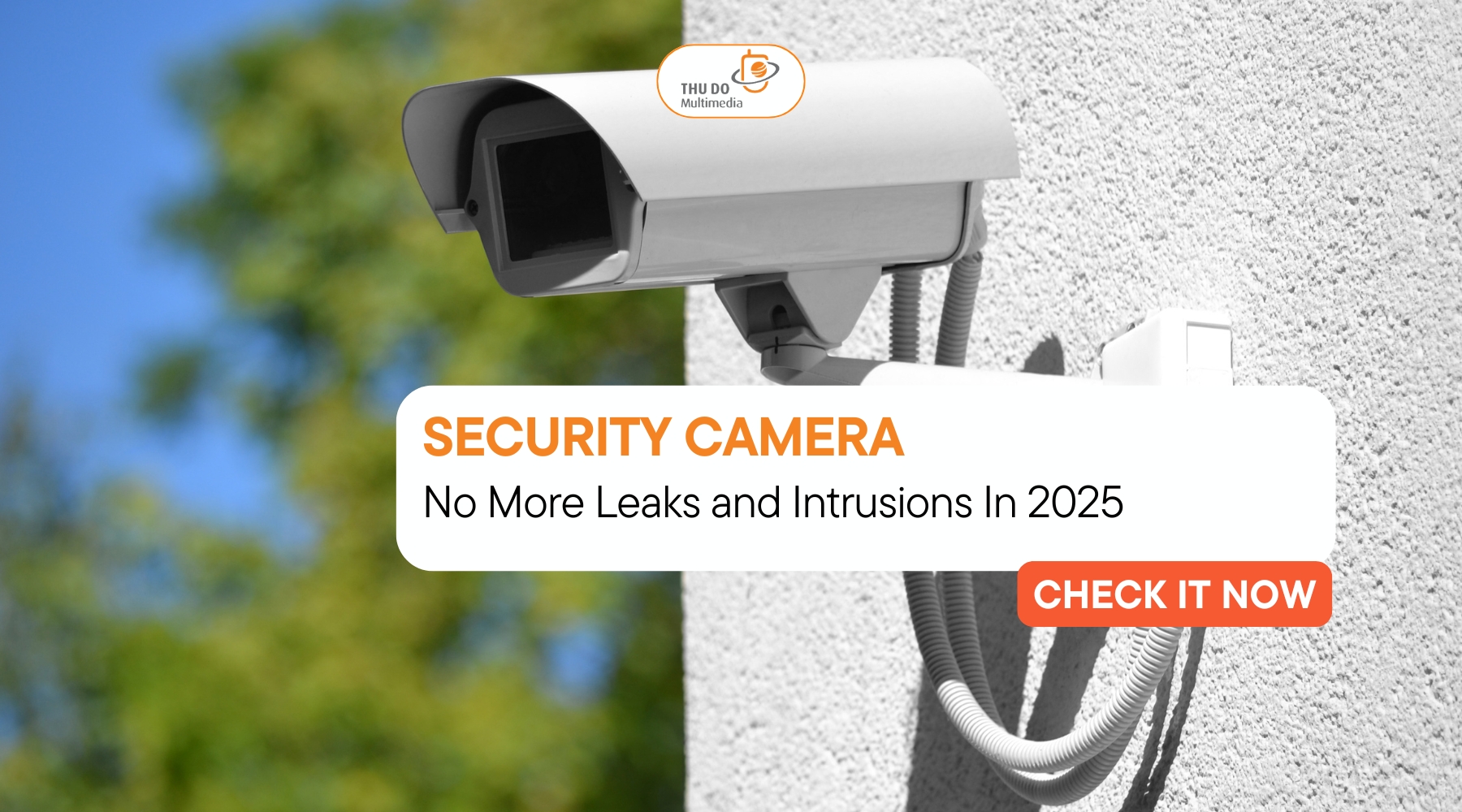Security cameras are often easily hacked due to poor security. Private images are leaked and exposed. Private, sensitive images are often sold, causing serious privacy violations, affecting the image of individuals, organizations, businesses and causing many other negative impacts. So how can we control this problem? Let’s learn more through the article of Thu Do Multimedia!
1. The current state of security cameras in the digital age
Currently, security cameras are considered “silent guards” in every home, office, and business. They monitor, record, and ensure that every movement is closely monitored. However, amid convenience and safety, a worrying truth is emerging: security cameras can become “open doors” for unwanted intruders. Security camera systems (IP cameras) are chosen by many people to ensure the safety of their families, to look after the elderly, children, and housekeepers, but in reality, they are loopholes for hackers to exploit and steal information for malicious purposes.
From a device considered a tool to help homeowners prevent theft and protect personal property, it is now at risk of becoming a “tasty bait” for many criminals to invade privacy, even blackmail the owner. Not only used in families, most stores, businesses, supermarkets, and banks also use surveillance camera systems to ensure safety, but they lack solutions to prevent hackers from breaking in and ensuring data security for the system. In Vietnam, in recent times, there have been many cases of private images being posted online due to hackers stealing them from home security camera systems.
2. Security Vulnerabilities: When the Guard Becomes the Weak Point
In an increasingly complex technological landscape, security camera security vulnerabilities have become one of the biggest concerns. Hackers are always looking for and exploiting weaknesses in the system to steal data, or worse, use secretly recorded videos for illegal dissemination. When the “guard” becomes an “open window” for bad guys, the important question is: where is the security of our security cameras?
A series of cases of information and image leaks. Private videos have shaken society, causing negative impacts on individuals, organizations, and businesses. It seems that in today’s digital society, camera information security is still not properly cared for and is somewhat lax in the security management process. In addition, with more and more camera devices everywhere, it is dangerous if these images are extracted for bad purposes.
This can almost destroy an individual or an organization depending on the severity. It is scary if we know that the truth is that cheap cameras on the market today have many vulnerabilities. Many cameras are used in families, in businesses, in parks. The frequency of appearance accompanied by security risks makes businesses and users always worried that, if one day suddenly images, information, videos of individuals, families, businesses are leaked for bad purposes and illegal trading. What if the world was always worried that one day it would happen to me?
2.1. The Development of the Security Camera Market in Vietnam
It is forecasted that by 2050, Vietnam will have more than 20 million security cameras in operation. Although this brings many conveniences in security monitoring, it also raises concerns about security and privacy risks. Figures show that Vietnam imports about 3.2 million security cameras each year, mostly from Chinese brands such as Dahua and Xiaomi. However, this increase in the number of security cameras brings with it an increasing risk of hacker attacks and personal data leaks.
A recent report found that more than 800,000 security cameras in Vietnam have been hacked, with nearly half of them at risk of being hijacked. This raises serious concerns about the security of personal information from surveillance camera systems. In particular, leaked videos are being sold openly online for $8 to $40 per clip, which not only affects security but also seriously violates users’ privacy.
To address this challenge, the Ministry of Information and Communications has been developing a National Technical Regulation on Information Security for Internet Protocol security camera systems. According to the new regulations, security cameras must be managed with secure passwords, regularly updated software, and use data transmission protection measures to prevent cyber attacks.
In addition, this regulation also requires data encryption and access control to protect users’ personal information from denial-of-service attacks and other cyber threats. Compliance with new technical standards will help enhance the security of security camera systems, ensuring data security in the increasingly complex digital context.
In the US, security cameras have become an indispensable part of monitoring and protecting public and private areas. Major cities such as New York, Los Angeles, and Chicago have invested heavily in camera systems to prevent crime and maintain security. However, along with rapid development, the US also faces many risks to privacy and cyber security.
Cyber attacks on security camera systems in the US are no longer uncommon, with many cases of hackers exploiting vulnerabilities to infiltrate and leak data. The US government has imposed data security regulations and requires camera manufacturers to adhere to strict encryption and access control standards. This has helped reduce the risk of unauthorized access, but security remains a major challenge, especially for low-cost cameras from China.
In India, the deployment of security cameras is on the rise, especially in major cities like Mumbai, Delhi, and Bangalore. Surveillance cameras in public areas, schools, and government buildings play a major role in reducing crime. However, India also faces security concerns when using security cameras.
The rapid growth of digital infrastructure and the Internet of Things (IoT) has made security cameras easy targets for cyberattacks. Security systems in India are not synchronized, leading to increased data breaches and personal information leaks. The Indian government is trying to tighten security regulations, but this remains a major challenge for an immature digital infrastructure.
The deployment of security cameras in countries like Vietnam, the US, and India is growing rapidly, bringing many benefits but also posing major security and privacy challenges. Information security solutions such as encryption, access management, and national compliance are important steps to protect personal data in an increasingly complex digital landscape.
3. Ways to protect before it’s too late
In the digital age with the increasing risk of cyber attacks, protecting your security camera system is a top priority.
Change your password regularly
Always control and change your password when using the camera. Never use the default password – it’s the “golden key” for hackers. Setting a strong password and changing it regularly will minimize the risk of being attacked.
Install indoor security cameras in less sensitive locations
Businesses should not install cameras in private and sensitive areas such as accounting rooms, data rooms or accidentally capture sensitive, confidential images of the company. Because if this is hacked, information will be leaked. You should install the camera outside in the hallway or balcony. Because if the security camera is hacked, the attacker will not be able to monitor it.

Update firmware regularly
Make sure your security camera system is always updated with the latest security patches. Security holes in legacy software can become a gateway for hackers to break in.
Use firewalls and VPNs
Firewalls and VPNs add an important layer of protection, preventing bad guys from accessing your system. They help shield data and prevent remote threats.
However, with hackers becoming more sophisticated, are these measures enough to protect your business’s digital assets?
4. What is the solution for long-term and sustainable security?
In the society of increasingly complex network security, temporary protection measures can only prevent threats in the short term. Changing passwords, updating software or using firewalls can minimize immediate risks, but hackers are constantly developing increasingly sophisticated attack methods.
Mr. Nguyen Ngoc Han – General Director of Thu Do Multimedia said that in the field of security cameras, currently each family has an average of 1 camera, but in the next few years, the whole country will have hundreds of millions of these devices and this is the first field with content that needs to be protected. The recent leak of private clips is proof that security in this field is still being neglected.

If businesses want to ensure truly sustainable security, they need a stronger, smarter protection system. It is a system that not only prevents current risks but also has the ability to predict and prevent any situation that may occur in the future.
This is where DRM (Digital Rights Management) technology comes in as a comprehensive solution. Not only that, with extensive experience in the DRM field, Thu Do Multimedia has invented the Sigma DRM solution,

internationally certified by Cartesian’s Farncombe Security Audit ®, an independent assessment method for security solutions, complying with content protection standards set by Hollywood studios and major content owners worldwide. Thu Do Multimedia is the first enterprise in Vietnam, also the only enterprise in Southeast Asia, and one of six enterprises in Asia to achieve this certification. More than just a data protection tool, Sigma DRM acts as a perfect shield, helping businesses manage and protect their digital content against threats of intellectual property infringement and copyright infringement.
Why do businesses need Sigma DRM solutions?
Comprehensive digital data management and protection
With Sigma DRM, businesses can set specific access rights for each user, ensuring that only authorized people can access documents, videos or other important digital assets. This not only protects content from unauthorized copying but also controls how it is used and distributed.
Long-term security – not just a short-term solution
Unlike temporary security measures such as passwords or firewalls, Sigma DRM provides a sustainable solution, helping to prevent infringements from the beginning. This technology acts as an active defense shield, constantly updating and predicting potential risks, bringing absolute peace of mind to businesses.
Protecting intellectual property rights and increasing profits
With Sigma DRM, businesses not only protect their digital assets but also optimize their intellectual property rights. This means minimizing damage from copyright infringement, while helping to increase profits from legally exploiting digital assets.
Comprehensive control on all platforms
A prominent advantage of Sigma DRM is the ability to control content on many different platforms and devices. Businesses can set limits on access time, number of devices or content resolution. This is especially useful when implementing marketing campaigns or when distributing digital content to customers.
Increasing trust and reputation for the brand
Safety and security are always top priorities in the modern business environment. By using Sigma DRM technology, businesses not only protect data but also enhance their reputation in the eyes of partners and customers. Tight security is a plus point that makes the brand more trustworthy.
Sigma DRM is a smart choice for the future of digital security
In the digital age, when data and digital content become valuable assets of businesses, investing in a comprehensive security solution such as DRM is no longer an option but an essential requirement. Only with a strong protection system can businesses feel secure in developing, expanding their scale and maintaining a competitive advantage in the market. However, Sigma DRM is the most comprehensive and complete version, reducing security risks to almost ZERO – when using the Sigma DRM solution. It is not just a tool, but a shield to protect the future of businesses, ensuring that all digital assets are safe, effectively managed and bring long-term value.
CONCLUSION
Security at your fingertips
Our world is changing every day, and technology brings both opportunities and challenges. Security cameras can be a powerful tool to protect us, but they can also be a double-edged sword if not properly protected. A combination of basic security measures and a long-term solution like Sigma DRM will be the key to keeping your system safe. Make the smart choice and take control of your security with Sigma DRM – the solution for a future without worrying about leaks or intrusions. Thu Do Multimedia – A companion for businesses in protecting and managing digital rights


Recent Comments